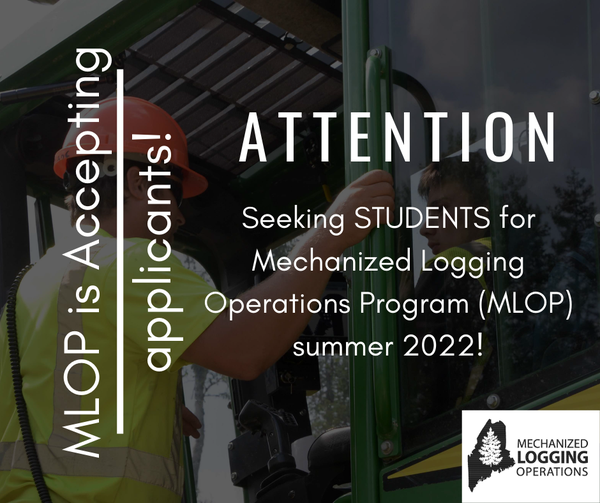2022 Mechanized Logging Operations Program Now Recruiting Students
SUMMIT TOWNSHIP – Recruiting is now underway for students in the 6th cohort of the Mechanized Logging Operations Program (MLOP), which is beginning its next 12-week class June 27 in the woods northeast of Old Town.
Students enrolled in the post-secondary training program will spend three months harvesting timber using sophisticated state-of-the-art machines like those they will encounter in the logging industry. The hands-on experience students gain operating equipment is something unavailable anywhere else in Maine and neighboring states and will prepare them for in-demand careers with logging contractors throughout the state of Maine. A report released by the University of Southern Maine in 2019 documented that up to 2,000 positions in timber harvesting and trucking will be available in the next decade. MLOP is one of the primary opportunities for new job seekers to enter the industry and earn more than $47,000 annually after completing a 12-week program.
This summer’s class will be the sixth since the program launched in 2017. Graduation for the class will be held September 15.
“There is no more affordable or efficient way to gain the experience and knowledge you need to begin a successful career as an equipment operator in the logging industry,” Dana Doran, Executive Director of the Professional Logging Contractors of Maine (PLC), said. “The Mechanized Logging Operations Program has a proven track record of achieving results and I would encourage any individual with an interest in a good-paying, exciting career in the Maine woods to consider it.”
The program, run out of NMCC, has been able to continue operating throughout the COVID-19 pandemic thanks to rigorous safety protocols and the outdoor nature of most of the training, which involves students operating equipment while communicating with instructors and other students via radios.
Tim Crowley, President of NMCC, said the program’s success stems from strong collaboration between the College, industry partners, and the Professional Logging Contractors of Maine, and is a model for how programs will be developed in the future. “It’s people working together, and this is the best example of its kind in the state of Maine,” Crowley said.
The program was jointly developed by the Professional Logging Contractors of Maine and NMCC with generous support from Milton CAT/CAT Forest Products, Nortrax Inc./John Deere, and other industry partners. With a strong emphasis on safety, students gain broad knowledge of the most common mechanical systems found in modern timber harvesting equipment, and an understanding of the variables of timber growth, tree species, and markets.
Supported by the Harold Alfond Center for the Advancement of Maine’s Workforce, students pay no tuition or fees and the program provides all required personal protective equipment (PPE).
While the logging industry has seen some contraction in recent years, the demand for skilled operators of the feller bunchers, harvesters, grapple skidders, forwarders, delimbers, and other mechanized logging equipment that now harvests more than 95 percent of all timber in Maine is strong. Many current operators are reaching retirement age and the steep costs of training new operators is driving up demand and wages. Mechanized logging operators are among the highest paid members of the logging workforce.
Anyone with an interest in the program should contact Leah Buck at Northern Maine Community College at 207-768-2768. Information may be found online at https://www.nmcc.edu/industry-customized-training/mechanized-forest-operations/
Additional information including videos on the program may be found on the PLC website at https://maineloggers.com/mechanized-logging-operations-program/


